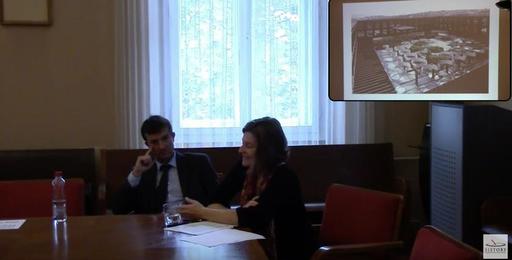/
Dogodki
/
Konference
Complex Parliaments in Transition: Central European Federations Facing Regime Change
International Workshop
Ljubljana, 16.10.2015

Soavtor(ji):Jure Gašparič, Andreas Schulz, Adéla Gjuričová, Mojca Šorn, Jurij Hadalin
Leto:2015
Založnik(i):Inštitut za novejšo zgodovino, Ljubljana, The European Information and Research Network on Parliamentary History, Haag, Kommission für Geschichte des Parlamentarismus und der politischen Parteien, Berlin, Institute of Contemporary History, Praga
Jezik(i):angleščina
Vrst(e) gradiva:video
Ključne besede:parlamentarna zgodovina, tranzicija, konferenca, parliamentary history, transition, conference
Posamezni prispevki:
- Adéla Gjuričová, »Coming to (Short) Life: The Czechoslovak Parliament 1989-1992«
- Bettina Tüffers, »The 10. Volkskammer - Only the pupil of a West German teacher?«
- Tomáš Zahradníček, »The federalization of a federal parliament«
- Jure Gašparič, »Last Socialist Parliament in Slovenia - pale "ratification body" or important political decision maker«
- Simona Kustec Lipicer, »Political (dis)ideology in the contemporary parliamentary arena in Slovenia«
- Aron Buzogany, »The Europeanization of Executive Federalism in Germany: The Role of Parliaments«
- Petr Roubal, »Velvet Revolution in The Czechoslovak Federal Assembly«
- Complex Parliaments in Transition: Central European Federations Facing Regime Change International Workshop, October, 16, 2015, Programme
Opis
Program delavnice je dostopen na tej kazalki.
Metapodatki (10)
- identifikatorhttps://hdl.handle.net/11686/34836
- naslov
- Complex Parliaments in Transition: Central European Federations Facing Regime Change
- International Workshop
- Ljubljana, 16.10.2015
- soavtor
- Jure Gašparič
- Andreas Schulz
- Adéla Gjuričová
- Mojca Šorn
- Jurij Hadalin
- predmet
- parlamentarna zgodovina
- tranzicija
- konferenca
- parliamentary history
- transition
- conference
- opis
- The collapse of socialist regimes in 1989-1990 set off multifaceted processes of democratic reforms and social and economic transformations. In some of the East-Central European countries, these transformations were even more complex due to their federal structure. Originally, the Soviet, Yugoslav or Czechoslovak federal systems had been projected for “engineered” socialist equalities of the member nations, while following the regime change of late 1980s, this basic precondition ceased to exist and various parts of federations began to express interests, use powers, build party systems and create ethnic publics. The workshop will explore some of these examples in detail, through comparing the transformations of three federal countries’ parliamentary systems in the early 1990s – the Czechoslovak, Yugoslav and German one. In Czechoslovakia, strong legal continuity between the socialist, revolutionary and post-socialist era created fascinating blends of the three images of parliament. The German case is ever more described through the colonization metaphor, which is interesting to test on the example of the East German Volkskammer. In Yugoslavia, where the already loose federal system kept getting looser, the individual federal republics with its own socialist parliaments eventually became the only really important political actors in the process of system and state disintegration (what was the role of federation and federal assembly?).
- založnik
- Inštitut za novejšo zgodovino
- The European Information and Research Network on Parliamentary History
- Kommission für Geschichte des Parlamentarismus und der politischen Parteien
- Institute of Contemporary History
- datum
- 2015
- 16. 10. 2015
- tip
- video
- jezik
- Angleščina
- imaDel
